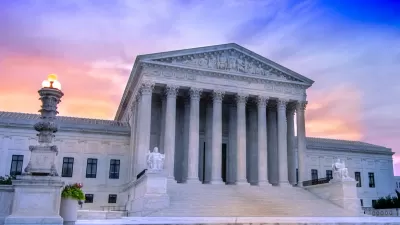The Supreme Court's ruling Tuesday in the Koontz case could have a chilling effect on all negotiations between government agencies and developers, says Bill Fulton. Are Alito and Kagan on the same planet?

The U.S. Supreme Court has tightened the screws on exactions, ruling in a case from Florida that government agencies must follow the Nollan/Dolan doctrine – even when a permit is denied and when the exaction involves money as well as property.
At a glance, the ruling would appear to strike down the California Supreme Court’s 17-year-old ruling in Ehrlich v. Culver City, 12 Cal.4th 854, which gave cities and counties more leeway on exactions when they are imposed as part of a general plan policy rather than a one-off permit.
Writing for the five-justice majority, Justice Samuel Alito resolved the most basic question in the case by saying that an actual taking did not have to occur in order for the property owner to have his constitutional rights violated. Writing for the four-judge minority, Justice Elena Kagan predicted that the ruling’s effects would be widespread and confusing because ordinary fee setting will now be subject to federal constitutional tests.
In a statement published on its website, the American Planning Association noted its disappointed with the ruling, calling it "an unnecessary blow to state and local governments attempting to reduce development impacts on the environment as well as engage in good-faith discussions with landowners to determine appropriate mitigation efforts."
FULL STORY: U.S. Supreme Court Tightens Screws on Exactions -- Is Ehrlich Dead?

Alabama: Trump Terminates Settlements for Black Communities Harmed By Raw Sewage
Trump deemed the landmark civil rights agreement “illegal DEI and environmental justice policy.”

Planetizen Federal Action Tracker
A weekly monitor of how Trump’s orders and actions are impacting planners and planning in America.

How Atlanta Built 7,000 Housing Units in 3 Years
The city’s comprehensive, neighborhood-focused housing strategy focuses on identifying properties and land that can be repurposed for housing and encouraging development in underserved neighborhoods.

In Both Crashes and Crime, Public Transportation is Far Safer than Driving
Contrary to popular assumptions, public transportation has far lower crash and crime rates than automobile travel. For safer communities, improve and encourage transit travel.

Report: Zoning Reforms Should Complement Nashville’s Ambitious Transit Plan
Without reform, restrictive zoning codes will limit the impact of the city’s planned transit expansion and could exclude some of the residents who depend on transit the most.

Judge Orders Release of Frozen IRA, IIJA Funding
The decision is a victory for environmental groups who charged that freezing funds for critical infrastructure and disaster response programs caused “real and irreparable harm” to communities.
Urban Design for Planners 1: Software Tools
This six-course series explores essential urban design concepts using open source software and equips planners with the tools they need to participate fully in the urban design process.
Planning for Universal Design
Learn the tools for implementing Universal Design in planning regulations.
Jessamine County Fiscal Court
Caltrans
Institute for Housing and Urban Development Studies (IHS)
City of Grandview
Harvard GSD Executive Education
Toledo-Lucas County Plan Commissions
Salt Lake City
NYU Wagner Graduate School of Public Service





























